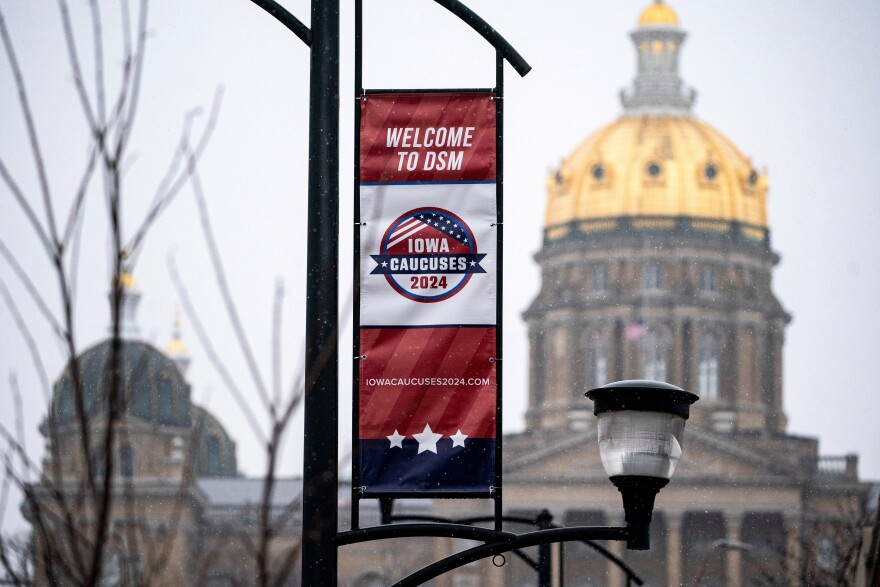Updated January 15, 2024 at 11:56 PM ET
For Iowa caucus updates, analysis and results, follow NPR's liveblog.
Former President Donald Trump has won the Iowa GOP caucuses, according to a race call by the Associated Press. The AP later called Florida Gov. Ron DeSantis for second place.
Businessman Vivek Ramaswamy, who is projected to finish in fourth place, announced Monday night he was suspending his presidential campaign, and endorsed Trump for the nomination while doing so.
The Associated Press declared Trump the winner of the Iowa caucuses based on an analysis of early returns as well as results of AP VoteCast, a survey of voters who planned to caucus on Monday night. Both showed Trump with an insurmountable lead. Initial results from eight counties showed Trump with far more than half of the total votes counted as of 8:31 pm. ET, with the rest of the field trailing far behind. These counties include rural areas that are demographically and politically similar to a large number of counties that have yet to report.
Republicans in the Hawkeye State began caucusing Monday on a frigid night to commence the presidential contest for 2024.
The caucuses are the first chance for Republican voters to weigh in on who they want to be their nominee. Trump leads overwhelmingly in polls for Iowa and nationally, as he faces 91 criminal and civil felony charges — including for actions he took as president related to the Jan. 6 insurrection.
The stakes are high. Here's what to watch out for:
- The margin of victory: Trump has been leading in the polls by historic margins in Iowa, an average of 34 points currently. The largest win ever in the GOP Iowa caucuses was 12.8 points. While the initial AP call that announced Trump as the winner of the caucuses had a 70-point margin between Trump and his competitors, that lead has only narrowed.
- The order of finish: The AP called second place Florida Gov. Ron DeSantis, who has held that position for the entirety of this campaign. Haley came in third.
- The weather: With a forecast set for a sub-zero high, the inclement weather likely greatly affected turnout. Trump is relying on first-time caucusgoers, as he did in 2016 when he lost Iowa narrowly. He has a much better ground game in Iowa this time around, but there's only so much you can do in those kinds of conditions.
Here's what you need to know about the caucuses:
What time do the caucuses take place?
They began at 7 p.m. CT (8 p.m. ET) and typically last roughly an hour. Caucusgoers wrote down their candidate of choice. In past years, depending on the size of the caucus, this could have been done through a show of hands. Votes were then tallied in front of caucus attendees and campaign representatives to be submitted to the state party.

Loading...
Who can vote?
Only registered Republicans can vote, but few of them do. The GOP turnout record is 186,000 set in 2016. That's only about 25% of total registered Republicans in the state.
Where do the caucuses happen?
They took place in 1,657 precinct locations across all 99 counties in the state, in spaces including libraries, churches and school gymnasiums.
The caucuses will determine how 40 delegates are selected for the party's national convention later this summer. Iowa will receive 2% of the total party delegates, and those delegates will be allocated proportionally.
What about Iowa Democrats?
Democrats also caucused, but they won't cast votes for president at them this year. Instead, they'll send mail-in ballots over the next few weeks, which the party will tally up by March 5 — releasing the state's primary results well after South Carolina's race in February. The reshuffling in the Democratic National Convention nominating calendar comes after calls for a state that is more demographically representative of the country go first. Plus, the race won't be as competitive since there aren't any major challenges to President Biden's bid for reelection.
Copyright 2024 NPR. To see more, visit https://www.npr.org.
Loading...



